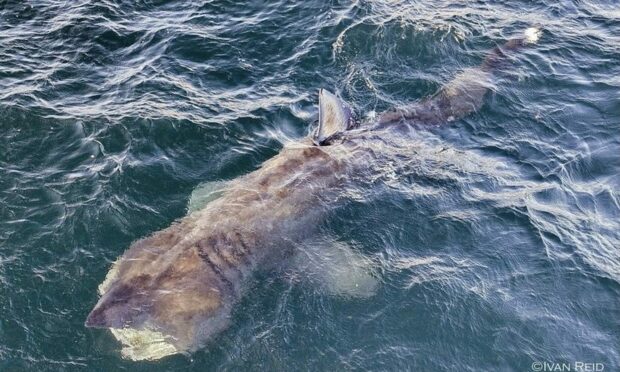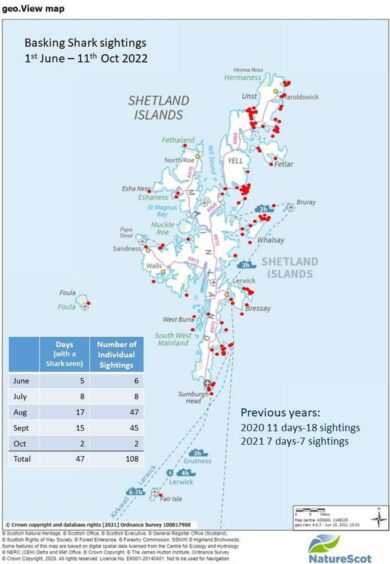Last year, just seven basking sharks were spotted off the coast of Shetland, but this year a phenomenal 108 have been found so far.
Karen Hall, marine mammal advisor for Nature Scot is responsible for collecting the data for cetacean and basking shark sightings around Shetland.
And this year’s incredible total has exceeded any expectations she had.
She said: “Every year you start looking at the months and start to get a general feel about how things are going.
“Into July we had quite a lot of basking shark numbers, then more kept coming in and I did a brief tally in August and thought ‘This is looking quite high.’
“I thought I’d leave it until into October when the numbers begin dropping off again and just see where we get to.
“I had a gut feeling it was going to be higher than usual, but I didn’t think it would be that high.”
‘Food chains are interlinked’
Ms Hall believes the plankton levels may be a contributing factor to the rise in basking sharks visiting Shetland, as there’s also been many minke whale, mackerel and herring sightings.
She explained: “Like any animal, they go to wherever their food supply is, and basking sharks are no different.
“There’s obviously been things going on this year that’s maybe brought the plankton closer into the shore or further north.
“The basking sharks have been attracted to that; we’ve certainly seen that with other species.
“I haven’t done the tally for minke whales yet, but I think it’s going to be substantially higher as well.
“We’ve seen lots of herring and mackerel inshore as well, they’ll be preying on plankton as well, so all the food chains are interlinked.”
In August, Shetlanders came together to rescue a stranded minke whale which eventually swam out to sea after being refloated in Levenwick.
‘An exploited species’
Basking sharks were hunted in the UK until 1995 when the last basking shark fishery closed and have been officially protected since 1999.
Since the practice came to an end, Ms Hall believes this is another potential reason more basking sharks are being spotted.
“They’ve been an exploited species, so (could it be that) they’re recovering, it’s not unusual for them to be in Shetland, but we’re not used to seeing them in this number.
“Although when you speak to some of the older fishermen they say, ‘Oh yeah, we used to get lots of them,'” she added.


Conversation